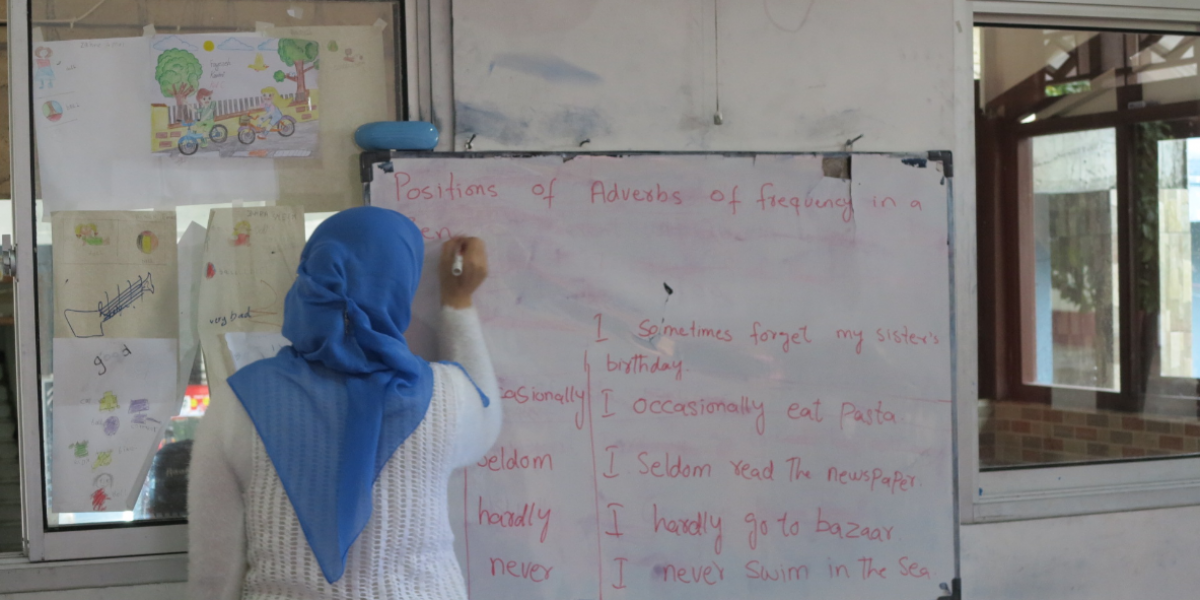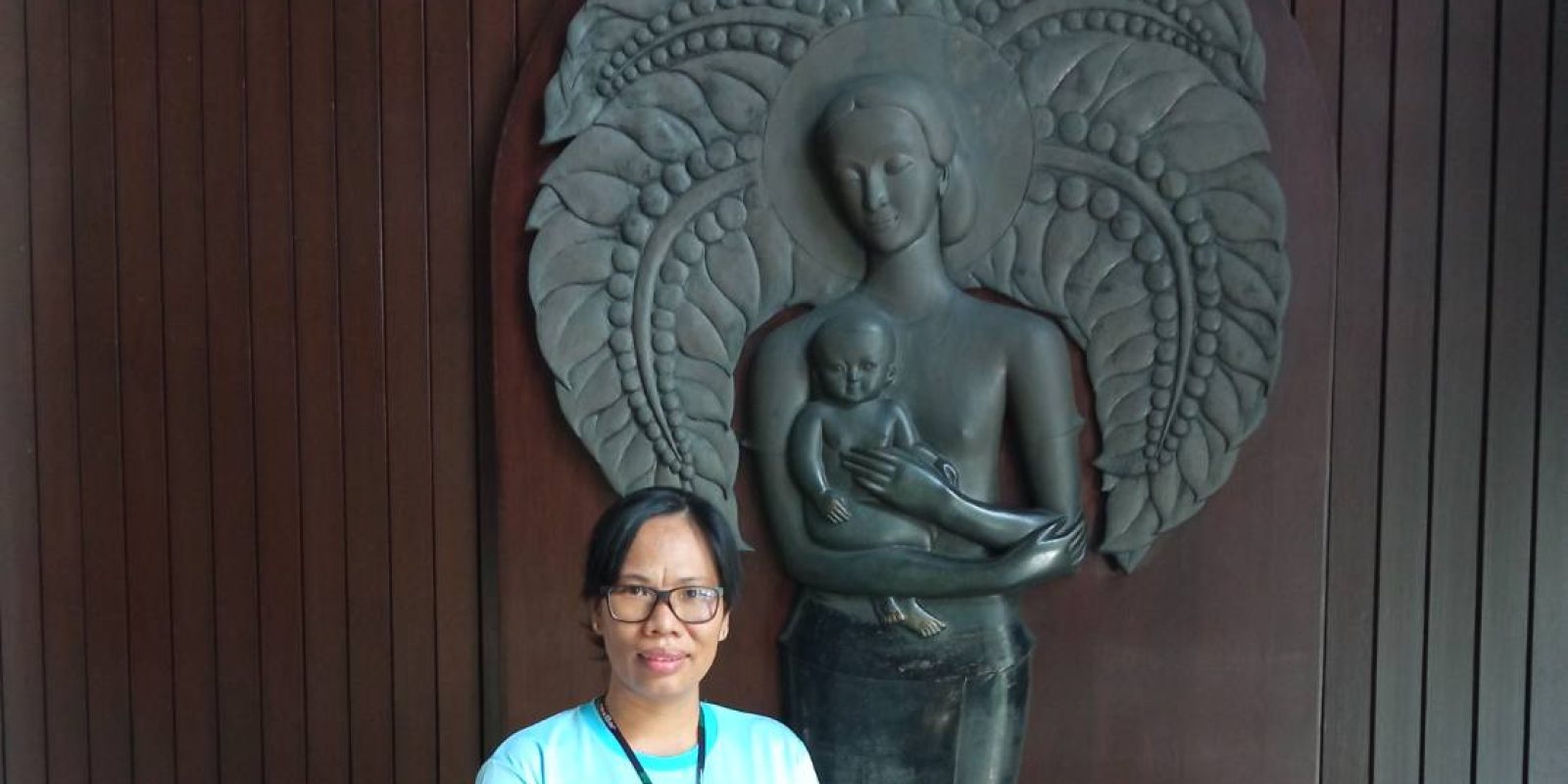Indonesia: Education in Cisarua
03 August 2015|Nick Jones

Upon my arrival in Bogor I met an endearing staff that have genuine concerns about the refugee situation in Indonesia. Their work with Afghan refugees, among others, was an enlightening experience for this JRS staff member.
I arrived with JRS Indonesia staff at the Cisarua learning center. The JRS Learning Centre in Cisarua has become a place where asylum seekers look for information, make requests for information to JRS and also engage in activities for the well being of their mental health.
One of these activities is English class. I discussed with both of the English teachers about their story, inspirations, and how I could be of service today. I was invited by Mohammed to join an Afghani English class, a class that is considered intermediate or advanced level. Majd, the other teacher, joined us. The students ages ranged from 18 to over 50.
Being from the U.S. typically has made my previous experiences with Afghans quite controversial due to the nature of my government’s intervention within their country. I found this encounter to be quite different. One of genuine pleasure for all involved, not only for language exchange but also cultural and value exchange as well.
Mohammed explained to me as I was a native speaker it would be a great opportunity for the Afghan men to learn, listen, and practice their English and requested I lead the class for the day. I obliged and sat down at the head of an oval the seven students had formed with their desks.
The assignment from last class was for each student to bring a topic of discussion to the next class for all the students to discuss with one another.
Afsar began the first topic of discussion with “What is love?” he said, “I am not sure what love is as I have not experienced it before”.
Almost immediately the students sat back almost afraid to answer or afraid to share such an intimate description of their own experiences. This topic did not provide the icebreaker as I had hoped. The class quickly moved to the second topic of discussion and the second topic was able to deliver and opened up the tense classroom.
Afshin said, “I ask all of you this because I do not know, but I’d like to know…what is it to be a great man?”
Arash raised his hand and said, “I feel that one who is able to take care of his family and provide for them should be considered a great man.”
Armin quickly responded, “What about those who do not have a family? Or do not have any family left? I think a great man should be one who lives his life to make his society better”.
Afshin replies, “I think both are good examples of what is a great man” looks at me, “What do you think?”
I pause for a moment and say, “A great man is based on one’s perspective but someone who is kind and good can be considered a great man.” I continue, I think Adelphi Stephenson’s famous quote applies here who once said “The average man is a lot more than average”.
Some nod in agreement and I look to Majd and ask “What is a great man?”
The class laughs, as Majd looks uncomfortable. He gathers himself quickly and points to the light bulb. He states, “A great man is…the man who invented the light bulb.”
Majd continued, “He is great because before him we all sat in darkness. Where would we be without his contribution to our society? He was a light in the darkness leading society for the better. His family’s daily life also improved with his invention. We never hear people say anything bad about him even though this new power of light could have made him powerful. I’d like to think that to be a great man, one is a torch bearer for his family and his society but stays humble doing so”.
All the students, including myself, applaud for the genuine and thought provoking answer.
The class continues with discussions on other topics such as; Afghan governance, Should children play games? Is it good to spend a lot of time on the phone? How can we make our society better? What are the benefits of exercise? And finally near the end of our class they raise questions about their education and English levels.
Azad asks “I want to know…when I will get my certificate stating that I have completed the JRS English course? I want to be able to show UNHCR at my RSD (Refugee Status Determination) interview that I have not been wasting my time like others. I have been trying really hard to learn English and I want them to see my efforts”.
Other students voice up in agreement with Azad’s question and Mohammed quickly speaks about the need for the 2nd part of the course to be finished.
It is obvious that many of the Afghan refugees are nervous about the RSD interviews. JRS in Cisarua conducts RSD training and mock interviews for the sake of these refugees. However, the determination of their status as refugees can instantaneously change their life so their concerns are understandable and expected.
Order is restored and Arash asks about my perception on the quality of the English classes and if there is an opportunity for more classes.
I said, “I think the overall level is quite high, which is a surprise considering many of you have not been learning English for that many years. I do like the fact there are Business English classes as it will prepare you long term to accomplish your own dreams and ideas.”
I continue, “I am not sure if there will be more opportunities other then the twice a week classes we currently have, but I will certainly share your concerns with relevant people to see if that is possible”.
Afshin asks the last question of the day, he states, “What tips or techniques do you have for us to speak with native speakers? I ask because we all understand you but we may not understand other speakers.”
I share with the Afghani students my own frustrations with learning foreign languages. How difficult it can really be, especially as it can depend on one’s environment, but I stress to the students its value.
“I think learning a language is also learning a skill. It will take time but it may provide you one day with a livelihood. Be patient with yourself as even native speakers in many languages go to University to become experts in their native tongue.”
“I would suggest that when native speakers are speaking to you that you request them to slow down. They probably don’t realize how fast they are going so politely request they slow down. Once you have said that, ask them to please be patient with your English. I think many will listen to your request and be glad you have chosen to learn English.”
Upon closing the day visiting other parts of the project in Cisarua I realize the importance of JRS activities with this community. It provides them an opportunity to keep their mind busy, interact with one another, and give inspiration to one another when trying to answer difficult questions.
What is a great man? Today the answer was a torchbearer. I think all these men wish to be torchbearers for themselves and their families. I hope these JRS activities keep lit their flame of hope so they one day can begin a life that allows them more opportunities to be a great man.
By Nick Jones in Cisarua, Indonesia
*If you think encouraging this group and others like it is worthwhile and would like to join JRS in this important work, please consider sending messages of support, donating through our website and/or circulating this article to people you think might like to do the same.
**Names have been changed to protect identities


